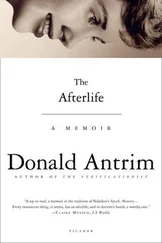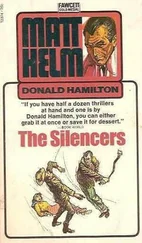“Hello,” I said.
“Am I in the air? Am I really in the air?” she asked.
“You are.”
“Is this flying?”
“It is.”
“We’re so high up. Lord, everyone is so small down there. Is this the ceiling? What happens if I bump my head? Can they see us from those little tables?”
“Sherwin can see us. And Peter Konwicki knows we’re up here. He doesn’t miss a thing.”
“What about the man holding us? Will he mind my being up here? Won’t he get tired?”
“Don’t worry about Richard. He’s very strong and determined. We have to trust him.”
Holding Rebecca, my heart sped up and the world inside the restaurant slowed — everything got slowed down, or things as I saw them broke down, something like that. How to describe this? I could see, intensely and clearly, fish swimming in their tank beside the cash register. I saw the colors on the fish. Bernhardt gently shifted his grip around me, and my breaths became slower and steadier, slower and deeper; and I saw a shiny spoon dangling in the air beside Rebecca’s head; and I saw, too, in great detail, as if photographically enlarged, rust in orange and brown blotches on the spoon. Light from above threw brightness across Rebecca, heat over the two of us. Peter Konwicki’s voice rose loudly above others’ in the noisy space: “He’s unprofessional and shouldn’t be allowed to have patients!”—followed with “Anybody can hang out a fucking shingle these days!” The air in the Pancake House was sweet with confectionery smells of food cooking. It was hard to say, in that first moment of Rebecca’s ascension, what anything seen or heard had to do with any other thing, or with me, or with her.
At first things between us were awkward. It was like we had met in the sky for a blind date. We were holding hands and our movements together were the commonplace, embarrassed gestures made by people making guesses about one another’s limits and desires. I tugged on her hand and she waved her arm, then pulled on me, and I floated over near her breast. I got my balance and frowned in a way intended to show her that I was not thinking about her breast. She kicked her feet; I tilted my body away. We were trying to avoid taking liberties. It was a dance of avoidance. You can see this kind of dynamic at work whenever a man teaches a woman with whom he is recently acquainted how to fish or shoot pool or throw a ball, and always the question is: “How much, and in what ways, can I feel her?”
Another way of asking the question might be: “What is this woman’s body telling me, if her body is telling me anything at all, about her readiness to accept me as a lover?”
“Stop kicking,” I told her.
“Sorry.”
“You don’t have to stick your arm out like that,” I said.
“I don’t?”
“Try this,” I suggested, maneuvering her gradually closer, in order to gain leverage and twirl her, if I could and she would be willing, partway around, facing away from me.
“Mind the rusty spoon,” I told her.
“I see it.”
She settled back toward me and I got a faceful of her hair. Wasn’t this what I had wanted all along? Rebecca’s hair’s smell was wonderful but difficult to classify — spicy in some way, and, for want of a better word, smoky, the perfume of wood burning in fireplaces.
“Do you build fires at home?” I asked her.
“Why do you ask?”
“Your hair. It smells like woodsmoke.” I took a deep breath. The scent of Rebecca’s black hair was an antidote to Richard’s cologne and sweaty clothes and his breath in my face.
“We have a fireplace, but we don’t use it. Probably everything in our house smells like soot, because the house is so old and moldy and rotten and gross.”
She kicked a couple of times, and I gave her hand a squeeze, then said, “You don’t smell like soot to me.”
“Thanks,” laughing.
I felt good. I felt happy and relaxed with my new friend. I said to her, “I know what you mean about smells in old houses. I love the eighteenth-century buildings along the riverfront.”
“Is that where you live?” she asked me. Little by little, we were getting to know one another.
“No. South side on the other end of College Hill, in a house that looks like a tugboat. Past the first light after the old municipal swimming pool. How about you?”
“We live on the north side.”
“Near the book factory?”
“I can see it from my window. That’s where my dad works. He fixes the machines.”
“How about that,” I said; and she came right out, as the young will, and asked me, “Do you have children?”
“No.”
“Why not?”
“No reason,” lying.
“Does your wife want to have a baby?” I could feel her hand’s pressure against mine, Rebecca’s fingers holding my fingers and touching, on my ring finger, the gold band.
“We talk about babies.” I felt, saying this, as if I were making a wrongheaded, compromising admission. Was I giving away information that properly belonged to Jane? Or was I merely regretting this necessary honesty, these polite formalities disguised as intimate disclosures — or was it the other way around, provocative intimacies hidden inside good manners? — in my conversation with Rebecca? Talking to the girl, holding her aloft while she kicked, I felt unfaithful. But to whom?
Rebecca? (Inevitably.)
Jane? (Unhappily.)
Maria? (Hardly, though, in a way, constantly.)
“Boy or girl?” Rebecca asked me. For a moment I was not certain what she was talking about. I was busy regretting my habit of wishing that I might become, briefly and at will, a different, more honorable person. Then I remembered. Children.
“Boy or girl, it doesn’t matter,” I told the flying waitress. It was my second lie in only a minute or two.
Rebecca confided, “I don’t want children. Women are supposed to want children. Maybe when I’m older I’ll want children. Johnny used to always talk about having them with me. After he left for college, he’d call on the phone, in the middle of the night, and start dreaming about the babies we were going to have. Sometimes we’d have a boy and a girl, sometimes a couple of each, and if Johnny had been out drinking then it would be a great big bunch of boys, a baseball team’s worth of boys. It was like he was talking to himself. There I am, one room away from Aunt Sylvia dying from her cancer. It’s the middle of the night and all I want to do is fall asleep and get out of school one day and move far away. Then the phone would ring and it would be Johnny, saying”—here Rebecca lowered her voice and spoke from the throat, imitating a teenaged boy’s deliberately gruff, mock-authoritative delivery, a girl’s imitation of a boy imitating a man—“‘I was just thinking about the two of us having our boys.’ He thought he was being romantic. He thought I should love him for saying those things. How was I supposed to think about the rest of my stupid life? I regret not sleeping with him. He was my boyfriend, it wasn’t like I was going to be forced to get pregnant. If you want to avoid getting pregnant, you can do that easily. I never relaxed. I was always saying no, no, no. I thought sex had to be a big deal. And it is! It is a big deal. I want it to be fun. What did I know at two in the morning when the phone rang and everybody else in the house was asleep or dying? I was mean. Do you think there’s something bad going on with me?”
“Not really.”
“You’re wrong. I’m not normal. I spend all my time being scared. I don’t like people my own age, but I don’t want to get old either. Sometimes I think I’ll be stuck working in this crappy joint for the rest of my life. By the way, you really shouldn’t eat here. They use rancid milk in the pancake batter and the maple syrup is nothing but corn syrup with flavoring, and there’s no real butter, and the cook never takes a bath or washes his hair, and there are roaches living in the oven, and the other day I saw a mouse.”
Читать дальше












